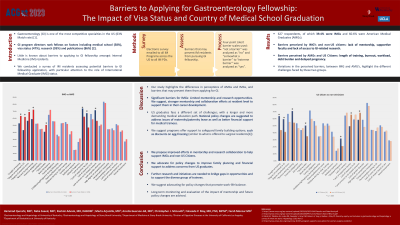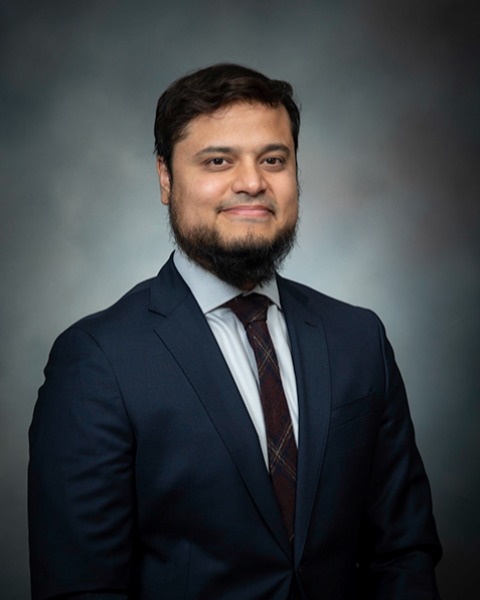Sunday Poster Session
Category: Practice Management
P1215 - Barriers to Pursuing Gastroenterology Fellowships for International Medical Graduates: A Survey Study
Sunday, October 22, 2023
3:30 PM - 7:00 PM PT
Location: Exhibit Hall

Has Audio

Hammad Qureshi, MD
University of Kentucky
Lexington, KY
Presenting Author(s)
Naba Saeed, MD1, Hammad Qureshi, MD1, Rashmi R. Advani, MD2, Marta Arjonilla, MD3, Arcelia GuersonGil, MD3, Farah Monzur, MD, FACG4, Folasade P.. May, MD, PhD, MPhil5
1University of Kentucky, Lexington, KY; 2Cedars-Sinai Medical Center, Los Angeles, CA; 3Stony Brook University, Stony Brook, NY; 4Stony Brook University Hospital, Stony Brook, NY; 5UCLA Health, Los Angeles, CA
Introduction: Gastroenterology is a highly competitive specialty with 1,046 applicants in 2022, of which only 656 matched. In the 2022 NRMP survey of GI program directors assessing factors influencing applicant ranking, being a graduate of a highly regarded medical school (58%), visa status(47%), interest in research (93%) & publications (86%) were important factors in the ranking decision. These are suspected to play a role in international medical graduates (IMGs) decisions to pursue GI fellowship training. This has never been studied at the resident level. We aimed to assess whether there was a difference in perceived barriers to applying for gastroenterology fellowship amongst IMGs and non-US citizens, compared to their counterparts.
Methods: An electronic survey was disseminated to IM residency programs nationwide. A Likert scale was used to assess barriers, where 1 = no and 2-4 = yes. Barriers were analyzed by visa status and place of graduation, using chi-square tests. Means were used to describe quantitative factors; frequencies (%) were used for qualitative factors. P < 0.05 was considered significant.
Results: There were 627 trainee respondents: 60.6% American medical graduates (AMGs) and 39.4% IMGs. 78.5% were US citizens, 8.9% were US Residents, and 12.4% required a visa. Distribution of respondents: 20.5% Midwest, 27.9% south, 30.5% from the Northeast. Mean age 30 years; 47.2% Caucasians. 41% married, 31.4% ≥1 child. 46.9% were interested in applying for GI fellowship.
Non-US citizen & IMG respondents perceived a lack of mentorship (74.1% vs 63.4%),lack of supportive faculty(67.5% vs 47.1%) & lack of access to GI-research(71.7% vs 57.5%) to be significant barriers(P< 0.05). US citizens and AMGs perceived length of training,burnout,degree of workload &debt burden as barriers more frequently(P< 0.05). (Table 1)
Discussion: Here we highlight the differences in mentorship and access to GI-research perceived by IMGs, compared to AMGs.AMGs usually find mentors during medical school, whereas most IMGs struggle to find mentors & research opportunities at the outset of residency. Strong GI mentorship pathways and initiatives for inclusivity need to be instituted during residency for IMGs, in order to help them surpass these barriers. Notably, time and burnout-related barriers in AMGs are possibly related to the longer & more financially demanding medical education pathway here. Further research should be done to investigate these barriers thoroughly, in an effort to create positive change.
Disclosures:
Naba Saeed, MD1, Hammad Qureshi, MD1, Rashmi R. Advani, MD2, Marta Arjonilla, MD3, Arcelia GuersonGil, MD3, Farah Monzur, MD, FACG4, Folasade P.. May, MD, PhD, MPhil5. P1215 - Barriers to Pursuing Gastroenterology Fellowships for International Medical Graduates: A Survey Study, ACG 2023 Annual Scientific Meeting Abstracts. Vancouver, BC, Canada: American College of Gastroenterology.
1University of Kentucky, Lexington, KY; 2Cedars-Sinai Medical Center, Los Angeles, CA; 3Stony Brook University, Stony Brook, NY; 4Stony Brook University Hospital, Stony Brook, NY; 5UCLA Health, Los Angeles, CA
Introduction: Gastroenterology is a highly competitive specialty with 1,046 applicants in 2022, of which only 656 matched. In the 2022 NRMP survey of GI program directors assessing factors influencing applicant ranking, being a graduate of a highly regarded medical school (58%), visa status(47%), interest in research (93%) & publications (86%) were important factors in the ranking decision. These are suspected to play a role in international medical graduates (IMGs) decisions to pursue GI fellowship training. This has never been studied at the resident level. We aimed to assess whether there was a difference in perceived barriers to applying for gastroenterology fellowship amongst IMGs and non-US citizens, compared to their counterparts.
Methods: An electronic survey was disseminated to IM residency programs nationwide. A Likert scale was used to assess barriers, where 1 = no and 2-4 = yes. Barriers were analyzed by visa status and place of graduation, using chi-square tests. Means were used to describe quantitative factors; frequencies (%) were used for qualitative factors. P < 0.05 was considered significant.
Results: There were 627 trainee respondents: 60.6% American medical graduates (AMGs) and 39.4% IMGs. 78.5% were US citizens, 8.9% were US Residents, and 12.4% required a visa. Distribution of respondents: 20.5% Midwest, 27.9% south, 30.5% from the Northeast. Mean age 30 years; 47.2% Caucasians. 41% married, 31.4% ≥1 child. 46.9% were interested in applying for GI fellowship.
Non-US citizen & IMG respondents perceived a lack of mentorship (74.1% vs 63.4%),lack of supportive faculty(67.5% vs 47.1%) & lack of access to GI-research(71.7% vs 57.5%) to be significant barriers(P< 0.05). US citizens and AMGs perceived length of training,burnout,degree of workload &debt burden as barriers more frequently(P< 0.05). (Table 1)
Discussion: Here we highlight the differences in mentorship and access to GI-research perceived by IMGs, compared to AMGs.AMGs usually find mentors during medical school, whereas most IMGs struggle to find mentors & research opportunities at the outset of residency. Strong GI mentorship pathways and initiatives for inclusivity need to be instituted during residency for IMGs, in order to help them surpass these barriers. Notably, time and burnout-related barriers in AMGs are possibly related to the longer & more financially demanding medical education pathway here. Further research should be done to investigate these barriers thoroughly, in an effort to create positive change.
Table: Barriers perceived by International Medical Graduates, Compared to American Medical graduates, to pursuing gastroenterology fellowship training.
Disclosures:
Naba Saeed indicated no relevant financial relationships.
Hammad Qureshi indicated no relevant financial relationships.
Rashmi Advani indicated no relevant financial relationships.
Marta Arjonilla indicated no relevant financial relationships.
Arcelia GuersonGil indicated no relevant financial relationships.
Farah Monzur: Medtronic (Covidien) – Consultant.
Folasade May: Exact Sciences – Consultant, Grant/Research Support. Freenome – Consultant. Geneoscopy – Consultant.
Naba Saeed, MD1, Hammad Qureshi, MD1, Rashmi R. Advani, MD2, Marta Arjonilla, MD3, Arcelia GuersonGil, MD3, Farah Monzur, MD, FACG4, Folasade P.. May, MD, PhD, MPhil5. P1215 - Barriers to Pursuing Gastroenterology Fellowships for International Medical Graduates: A Survey Study, ACG 2023 Annual Scientific Meeting Abstracts. Vancouver, BC, Canada: American College of Gastroenterology.
